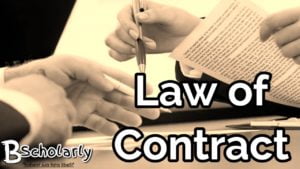The rule in Pinnel’s Case [1602] 5 Co. Rep. 117a (also known as the rule in Penny v Cole) is one of the popular common law rules in the law of contract. In my opinion, the rule in pinnel’s case is a rule that every lawyer must know. The reason is because, the problem which this rule tends to solve can come up in any contract. In this article, i will extensively discuss the rule in pinnel’s case and explain all the exceptions to the rule. In other words, this article will be an eye opener on the rule in pinnel’s case and the instances where the rule will not apply (exceptions).

On that note, if you have been searching the internet to know what the rule in pinnels case is all about, or the exceptions to the rule in pinnel’s case, you are in the right place. Just make sure that you read the content of this article painstakingly so that you will grasp all that is explained here.
You may also want to read:
- Exceptions to the rule in Adams v Lindsell
- Donoghue v Stevenson: Facts, Issues and decision of the court
- See the exceptions to privity of contract rule
- Mojekwu v Mojekwu: Facts, Issues and Decision of the court
What is the rule in Pinnel’s Case?
The rule in pinnel’s case is also known as promissory estoppel. The rule states that payment of a lesser sum than the amount due does not discharge the larger sum. Thus, where the sum of money which the defendant pays to the plaintiff at the plaintiff’s request is a lesser part of the sum which the defendant is already liable to pay to the plaintiff, nothing more than an existing obligation is discharge by the defendant and so the payment which he makes cannot serve as consideration.

Take for instance, If Mr. Ben owes Mr. John $10,000 and Mr. Ben, at the request of Mr. John, pays just $5,000 of the amount, Mr. Ben will not by that payment be discharged of his obligation to pay Mr. John the balance. The reason is because, Mr. Ben is already bound to pay the total amount of $10,000. By paying part of the amount, he is not doing anything more than he is bound to do.
In other words, he has paid no price for Mr John’s promise. Absence of consideration is therefore the basis of the rule in pinnel’s case. It is usually called promissory estoppel in contract law.
The video clearly explains the fact, issues and decision of the court in pinnel’s case. I strongly recommend that you watch this video before reading this article in full. Trust me, you will love it.
Also read: List of law reports in Nigeria today and their abbreviations
Exceptions to the rule in Pinnel’s Case
Below is a detailed explanation of some of the exceptions to the rule in pinnel’s case (promissory estoppel):
1. If the payment of the lesser sum is made in a mode different from that originally agreed upon:
The Rule in pinnel’s case will not apply if the payment was to be in cash, but the lesser amount was paid in kind. For example: Mr Ben owes John $1000. At John’s request, Mr Ben gives John a bag of rice valued at N800 in return for John’s promise not to demand the balance of the amount owned. The giving of the bag of rice constitutes a new element in the method of payment and therefore satisfies the requirement for consideration necessary to support a contract.
The legal reason behind this is that, by asking for a bag of rice from Mr. Ben, John may have considered it more useful to him than the sum of $1000 owed him and hence that bag of rice constitute a price or consideration for John’s promise to forgo the balance. It is pertinent to also note that this exception will apply even when price of the form which was used is of lower price. It is indeed one of the exceptions to the rule in pinnels case.

2. Payment of a lesser sum at an earlier date:
Another exception to the rule in pinnel’s case is where the payment of the lesser sum is on an earlier date. This exception holds that where there is payment of a lesser sum at an earlier date, the creditor will be estopped from getting the full sum.
Take for instance, If the full amount is due in June and the creditor request the debtor to pay him part of it in March in return of his promise to forego the balance, the payment at earlier date in March constitutes a new element and satisfy the requirements for consideration.
3. Payment of a lesser sum in a different place:
This exception to the rule in pinnel’s case will apply where the payment is made at a different place from place originally appointed for the payment. For instance, if Mr. Ben owes John $1000 payable in Nigeria but they both meets at Oxford Street in London during a summer holiday.
John request Mr. Ben to pay him $500 there and then in return of John’s promise never to ask for the balance. If Mr. Ben pays this money to John in London as requested, that payment will discharge his indeptedness to Mr. John and he cannot afterwards demand the balance.

Also read:
4. Where the sum is unliquidated or disputed:
It is also an exception to the rule in pinnel’s case where the sum is unliquidated or dispute. In this situation, payment of a smaller sum will operate satisfaction from larger sum. For example, where the lesser amount is paid as part of a comprehensive settlement involving a variety of claim on both sides.
In Grayshot Enterprises Ltd v Minister of Agriculture, the appellant had on 29 January 1997 obtained judgment against the respondent from the High Court in a suit filed on the undefended list of sums of money from goods supplied. The judgement was declared in the following terms:
- US $4, 178,236 being the principal debt;
- US $611,312. 08 being the cost of demurrage;
- Total US $4,789,548.93 with interest at the rate of 21% per annum from January, 1994 to final liquidation of the judgment debt.
By a motion on notice filed in the same court on 19 September 2000 the appellant judgement creditor sought an order directing the respondent to pay to the registrar of the Court of the federal capital territory forthwith the sum of 39,300,000 being the amount in which the respondent was indebted to the appellant in respect of the judgment obtained against them on 29 January 1997; and an order directing the Registrar of the High Court to pay over to the appellant the amount of money received by him from the respondent.
The respondent filed a counter-Affidavit in opposition to the application wherein it denied any indebtedness to the appellant under the judgment debt. In essence, the respondent averred that it had liquidated the whole amount awarded to judgement creditor/appellant by way of principal and demurrage totalling US $4,787,548.93 it was further averred in respect of the award of the interest that the parties had agreed that 6% of the principal sum which was agreed at US $1,029,814.56 be paid to the appellant in full and final settlement of the respondent’s indebtedness to the appellant in respect of the judgement. The respondent in fact pleaded accord and satisfaction.
The court held that the rule in Pinnel’s case does not apply where the creditor’s claim on its amount is disputed in good faith. In such a case, the value of the creditor’s claim is doubtful and the debtor therefore provides consideration by paying something, even though it is less than the amount claimed.

5. Composition with creditors:
The Rule in pinnels case will not apply where for instance, A owes money to different persons, B, C, D and E and the amount of money in A’s possession is such that all the creditors cannot be paid in full. They may agree amongst themselves to accept a fraction of their individual debt from A in discharge of the whole sum in each case.
Thus, if A owes B, C, D and E $1,000 each and he can only lay hands of $2, 000. B, C, D and E may agree that rather than any two of them getting full payment whilst the other two get nothing but a cause of action, they should each accept $500 in full discharge of their individual debts of $1,000.
Such an agreement is binding on all of them and none of them can subsequently sue A for the balance of his debt. This is also called composition with creditors.
6. Part-payment of a debt by a third party:
Yes, this is also one of the exceptions to the rule in pinnels case. Where there is part-payment of a debt by a third party the rule in pinnel’s case will not apply. For example, the debt is owned to only one person and the debtor unable to pay for it. A third party offers to pay a smaller sum in discharge of the whole debt.
Once the creditors accepts the money proffered by the third party, he cannot sue the debtor for the balance of the debt. He is bound by the agreement under which he accepts a smaller account from the third party. In Hirachand Punamchand v Temple, it was a debt was discharged when the creditor accepted a smaller sum from the debtor’s father in full settlement.
Also read:
- Characteristic of human rights: 3 features of human right you should know
- See the key pillars of democracy
- How to become a successful lawyer: 7 successful lawyer qualities
- See the reasons for military intervention in Nigeria
- History of the legal profession in Nigeria
Yeah! Those are basically all the exceptions to the rule in pinnel’s case. Like i have said before, this rule is one of the contract rules that every lawyer should have at his fingertips. It is an interesting rule and usually apply there is a promise to let go a debt, by someone without any consideration given in return for his promise. It is pertinent to note that the exceptions to the rule in pinnel’s case is also the exception to promissory estoppel.
Hope this article was helpful? If this article was educating, kindly let me know using the comment section. I will be glad to hear from you.

Edeh Samuel Chukwuemeka, ACMC, is a lawyer and a certified mediator/conciliator in Nigeria. He is also a developer with knowledge in various programming languages. Samuel is determined to leverage his skills in technology, SEO, and legal practice to revolutionize the legal profession worldwide by creating web and mobile applications that simplify legal research. Sam is also passionate about educating and providing valuable information to people.
A very good read.
Great ! Very comprehensive and explicitly explained.
Good
Buh more explanation is needed
Very explicit and details. Can you further explain the forth exception to the pinnel’s case
the information was very useful